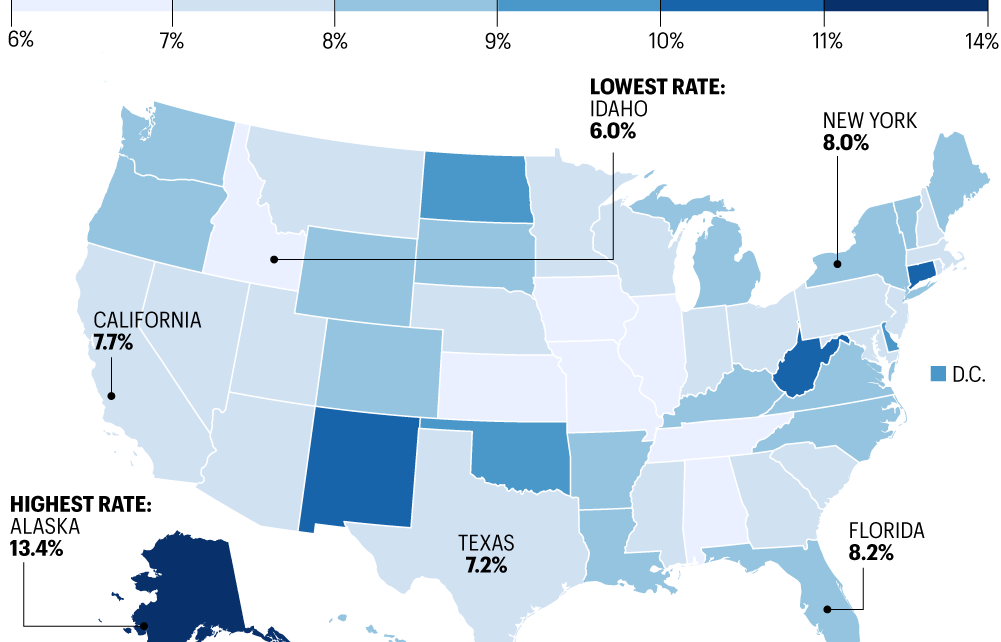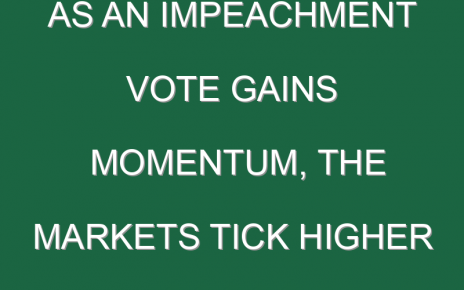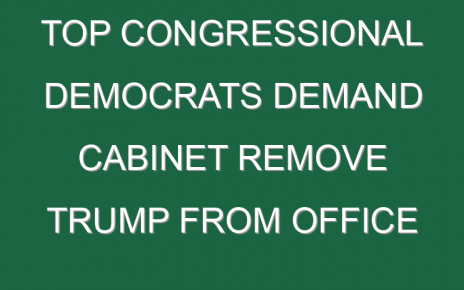Even with the continued spread of more contagious coronavirus variants across the country, the past week has brought lots of news to cheer on the pandemic front: a significant decline in new cases, favorable data on the efficacy and performance of three additional vaccines likely to speed the U.S. rollout (Johnson & Johnson, Novavax. and AstraZeneca), and the fact that another 2.5 million Americans have received at least one dose of a vaccine against COVID-19.
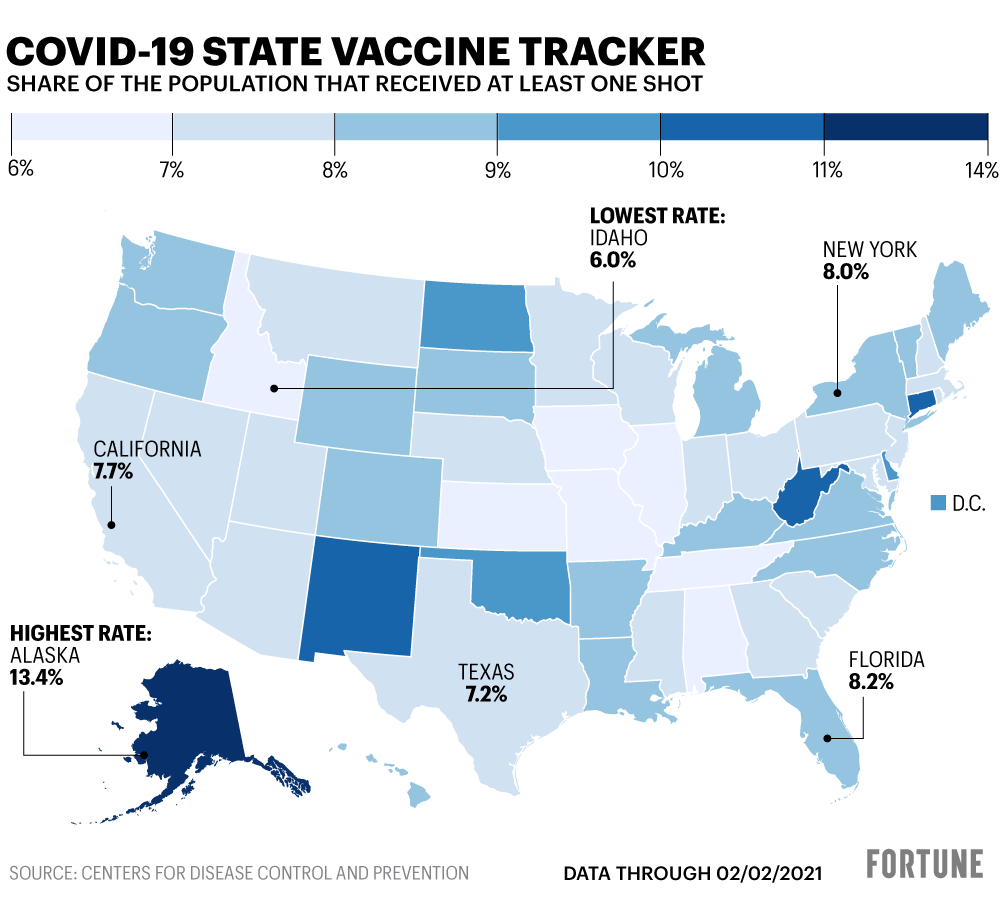
Through Tuesday Feb. 2, 8.2% of the U.S. population, or 27.2 million people, had received at least one shot according to data from the Centers for Disease Control, up from 24.7 million the week before. Another 6.4 million individuals had received both doses of the coronavirus vaccine. Of the 55.9 million doses of Pfizer and Moderna vaccines distributed across the U.S., roughly 61% have been administered.
The picture is increasingly mixed across states in terms of the status of the COVID vaccine campaign. Alaska remains out front with 13.4% of its population having received at least one dose of the vaccine, the largest percentage across the country. That equates to roughly 126,000 doses administered, which is nonetheless many fewer than in more populous states. (In California, 3.7 million doses have been administered; in Texas, 2.7 million.) West Virginia, New Mexico, and Connecticut have also reached more than 10% of their populations with the vaccine. For the second week, Idaho trails the rest of the country in terms of the percent of people vaccinated, with just 6% of residents having received at least one dose.
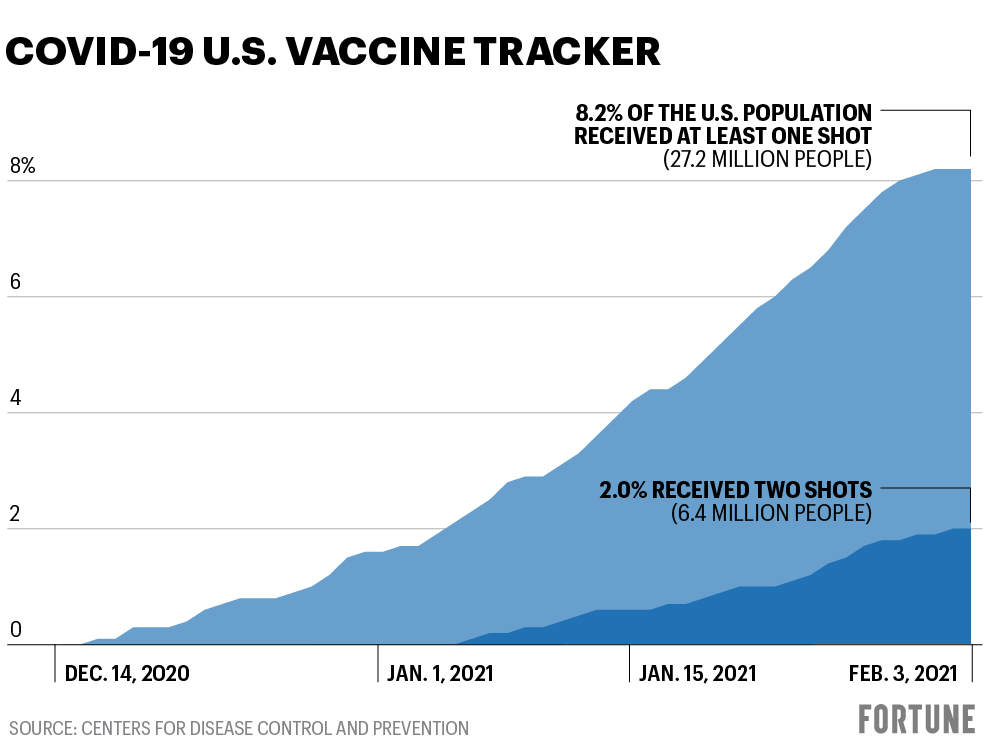
While the steadily growing number of vaccinated Americans can be considered progress in the battle against COVID, the past week has also brought more evidence that the rollout, so far, reflects disparities in health care access and outcomes that have defined the pandemic in America: Even as populations of color have accounted for a disproportionate number of cases and deaths due to COVID, a preponderance of available vaccines appear to be going to affluent, white people.
SHARE OF THE POPULATION THAT RECEIVED AT LEAST ONE SHOT
| State or territory | Share vaccinated |
| Alabama | 6.6% |
| Alaska | 13.4% |
| Arizona | 7.6% |
| Arkansas | 8.5% |
| California | 7.7% |
| Colorado | 8.2% |
| Connecticut | 10.3% |
| Delaware | 9.1% |
| District of Columbia | 9.2% |
| Florida | 8.2% |
| Georgia | 7.7% |
| Hawaii | 8.2% |
| Idaho | 6.0% |
| Illinois | 6.8% |
| Indiana | 7.7% |
| Iowa | 6.3% |
| Kansas | 6.6% |
| Kentucky | 8.1% |
| Louisiana | 8.3% |
| Maine | 8.2% |
| Maryland | 7.5% |
| Massachusetts | 7.2% |
| Michigan | 8.2% |
| Minnesota | 7.6% |
| Mississippi | 7.5% |
| Missouri | 6.1% |
| Montana | 7.8% |
| Nebraska | 7.2% |
| Nevada | 7.7% |
| New Hampshire | 7.7% |
| New Jersey | 7.9% |
| New Mexico | 10.4% |
| New York | 8.0% |
| North Carolina | 8.2% |
| North Dakota | 9.5% |
| Ohio | 7.6% |
| Oklahoma | 9.4% |
| Oregon | 8.6% |
| Pennsylvania | 7.2% |
| Rhode Island | 7.0% |
| South Carolina | 7.6% |
| South Dakota | 8.9% |
| Tennessee | 6.8% |
| Texas | 7.2% |
| Utah | 7.7% |
| Vermont | 8.9% |
| Virginia | 8.9% |
| Washington | 8.1% |
| West Virginia | 10.9% |
| Wisconsin | 7.9% |
| Wyoming | 8.5% |
More health care and Big Pharma coverage from Fortune:
- The 3 major fixes broken health systems need, according to experts
- Do COVID vaccines stop coronavirus from spreading or just make you less sick?
- What we know about the 5 biggest problems with the COVID vaccine rollout
- Johnson & Johnson’s lower-immunity single-dose COVID vaccine might be just what the doctor ordered
- Why Europe’s summer COVID vaccination target could still be on track


